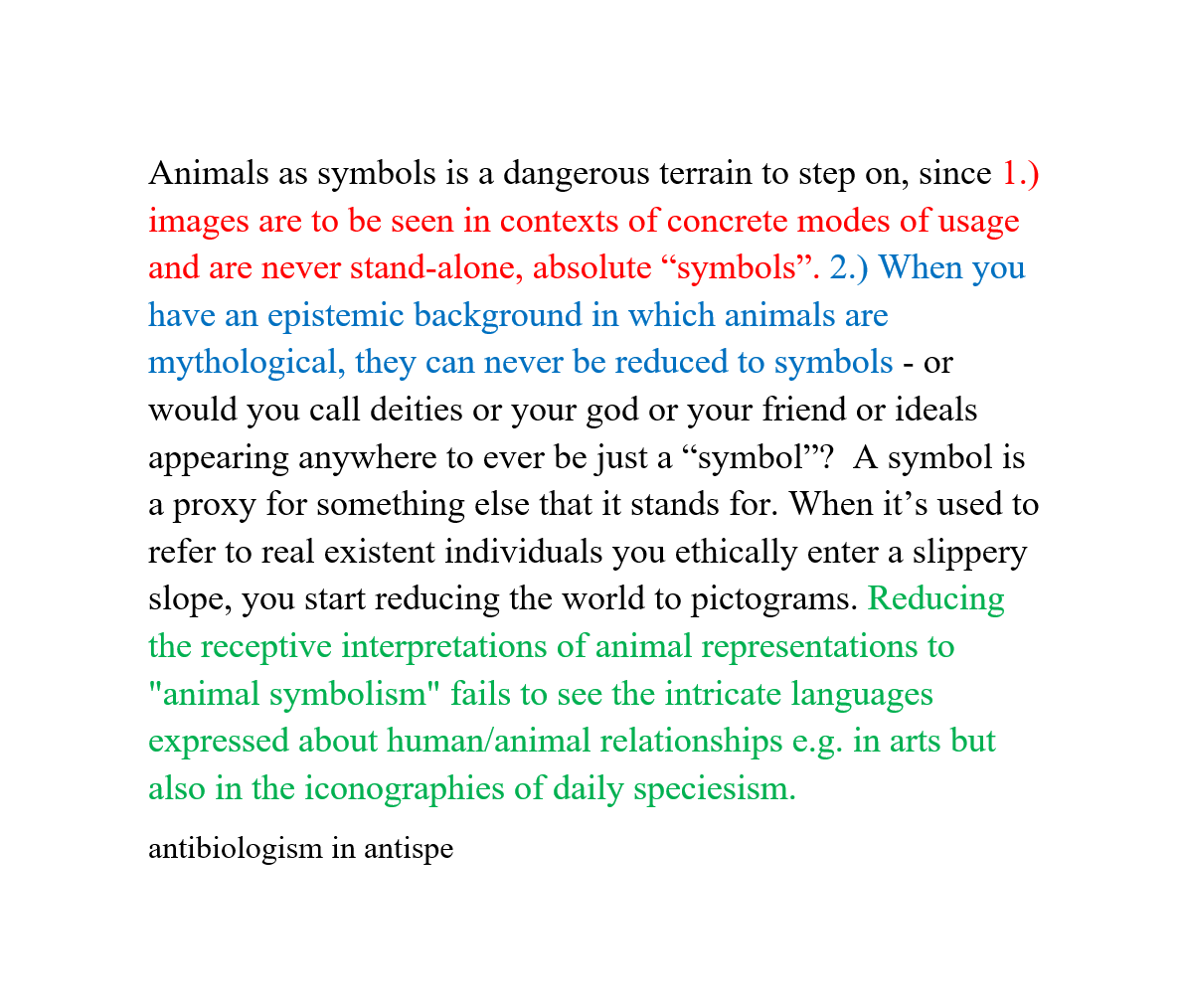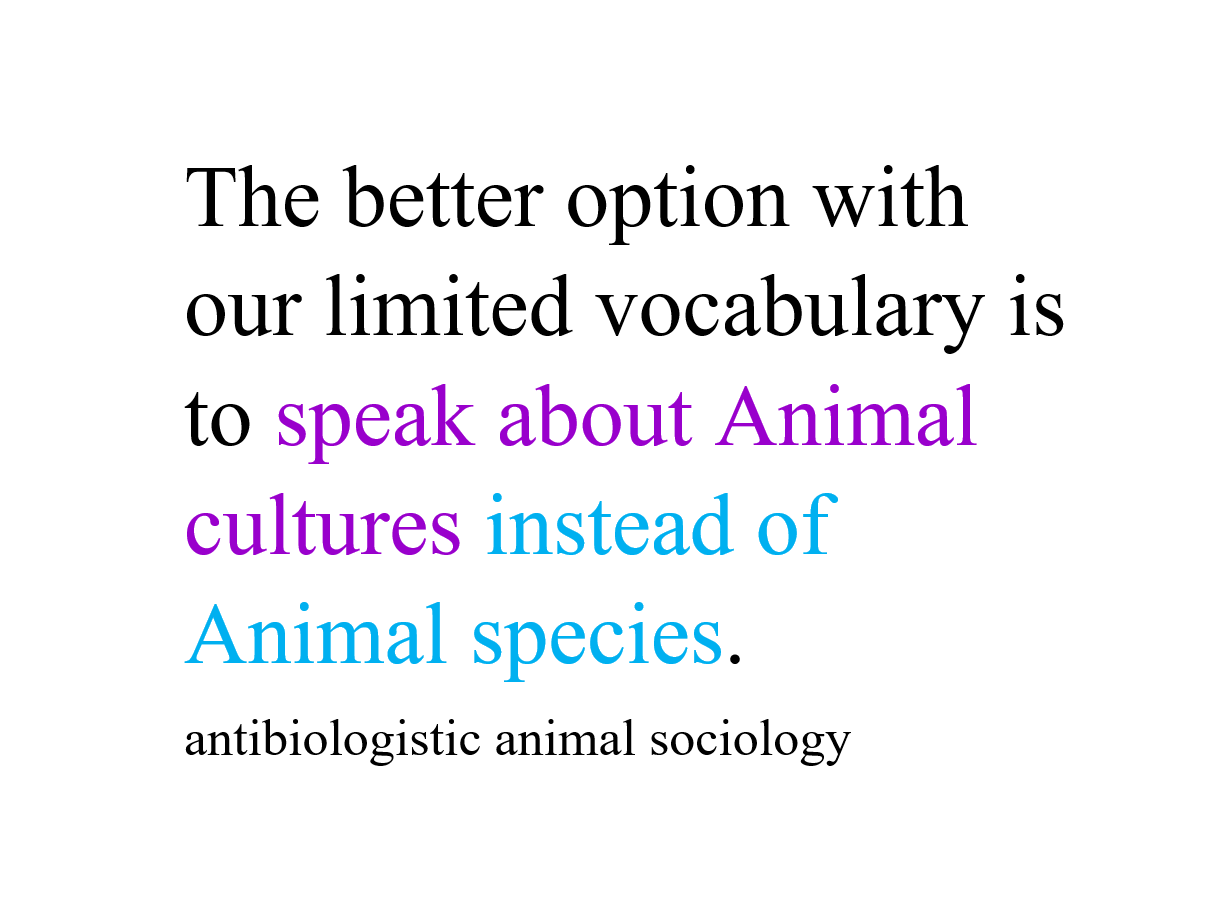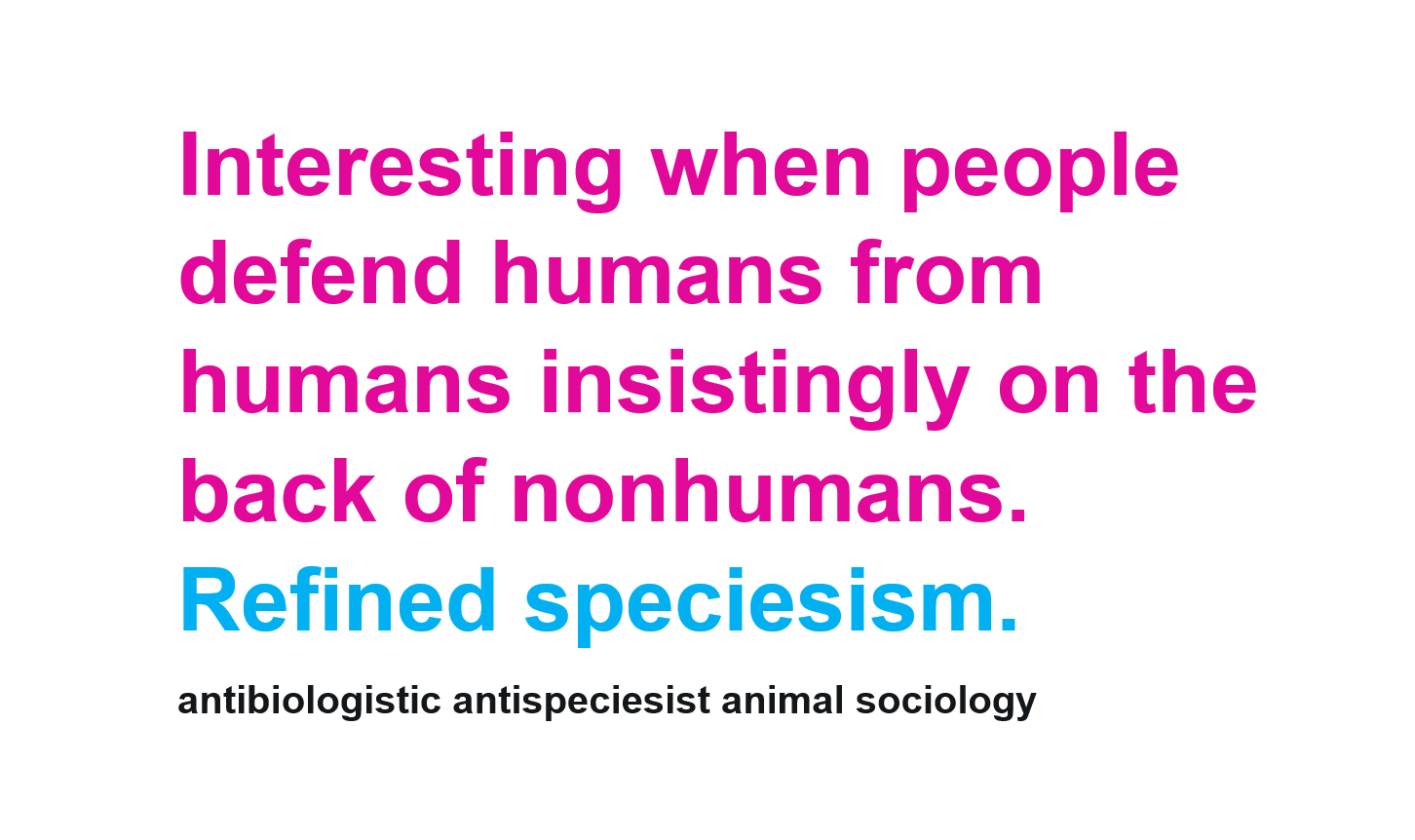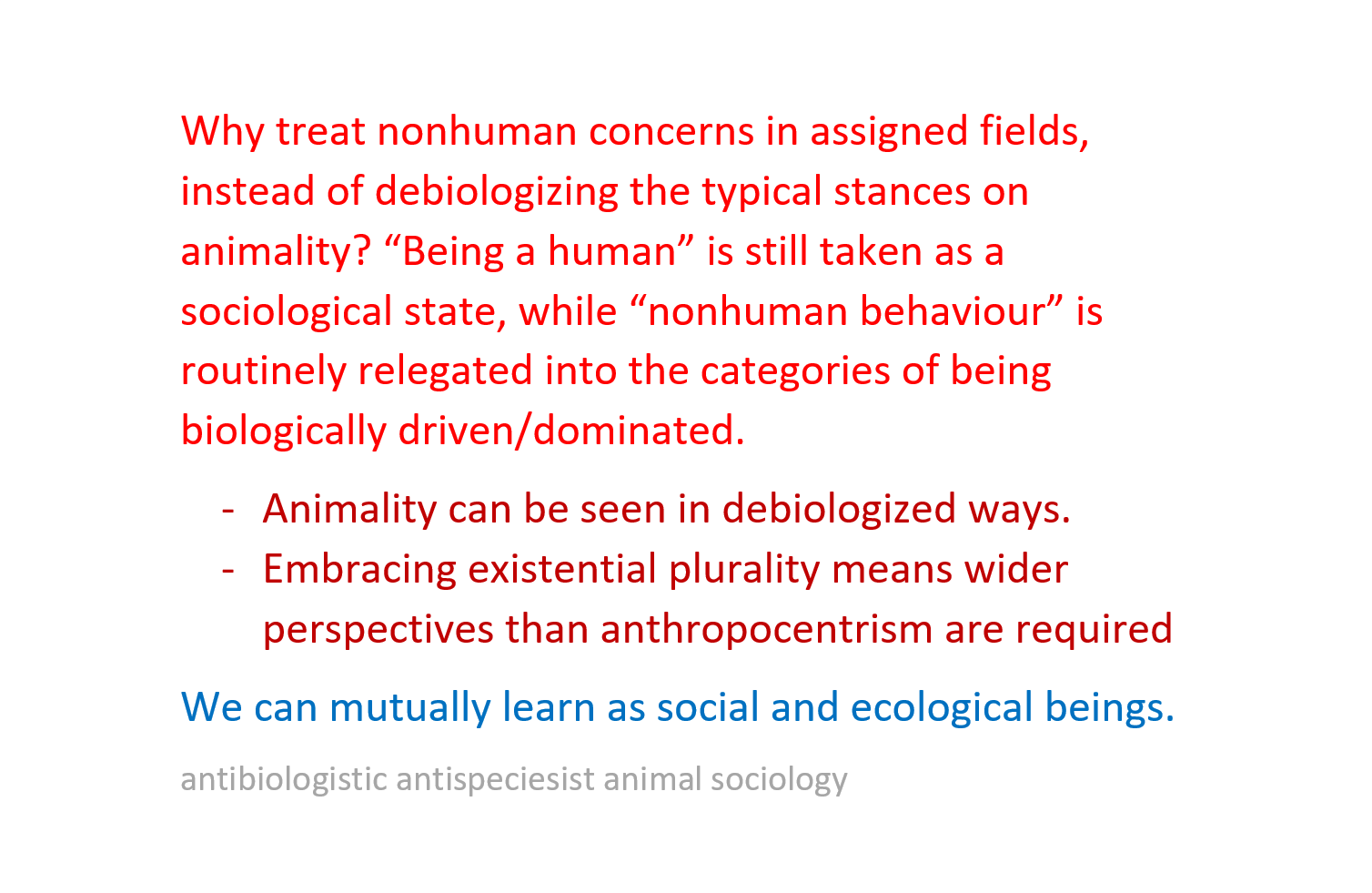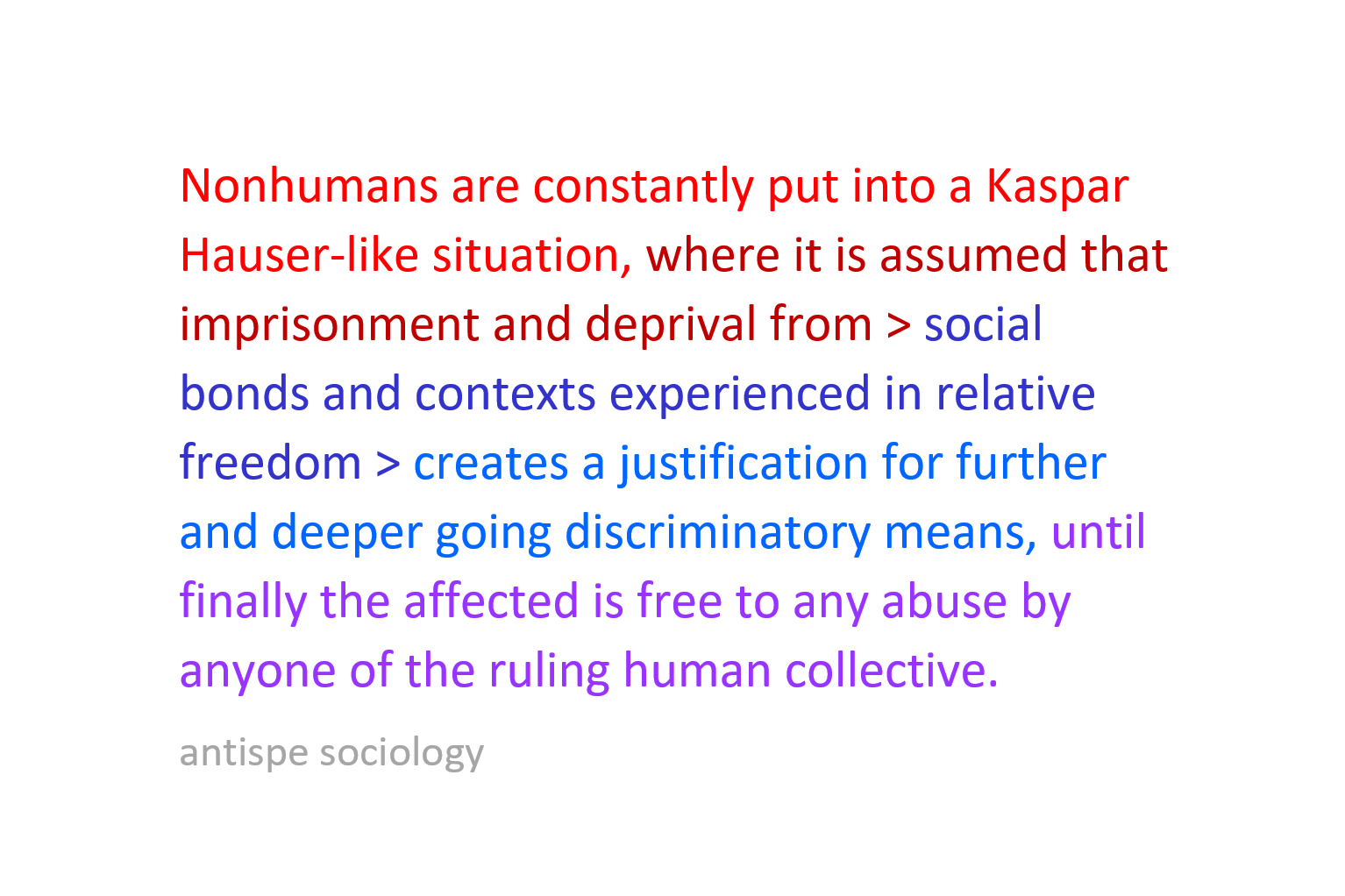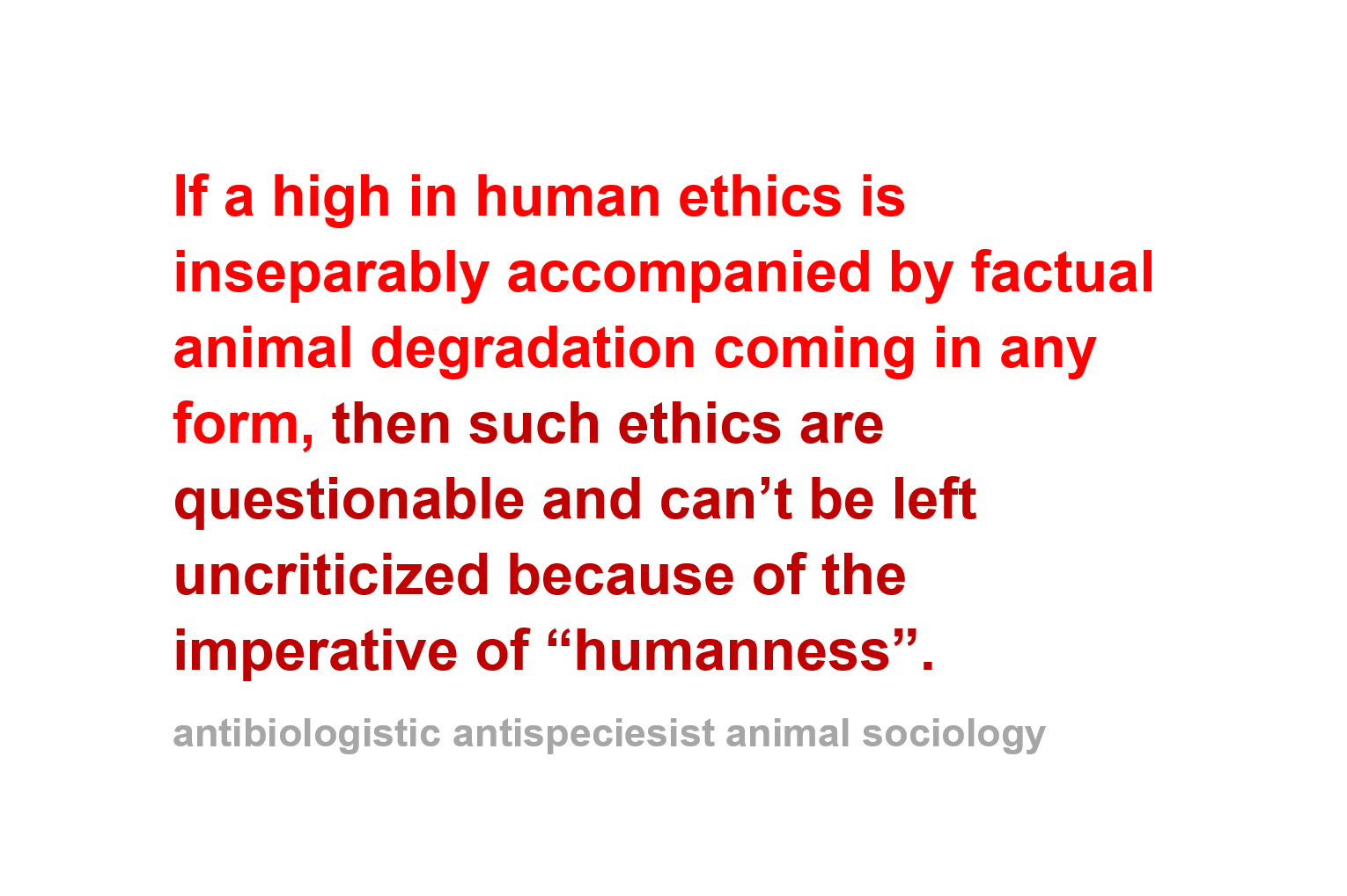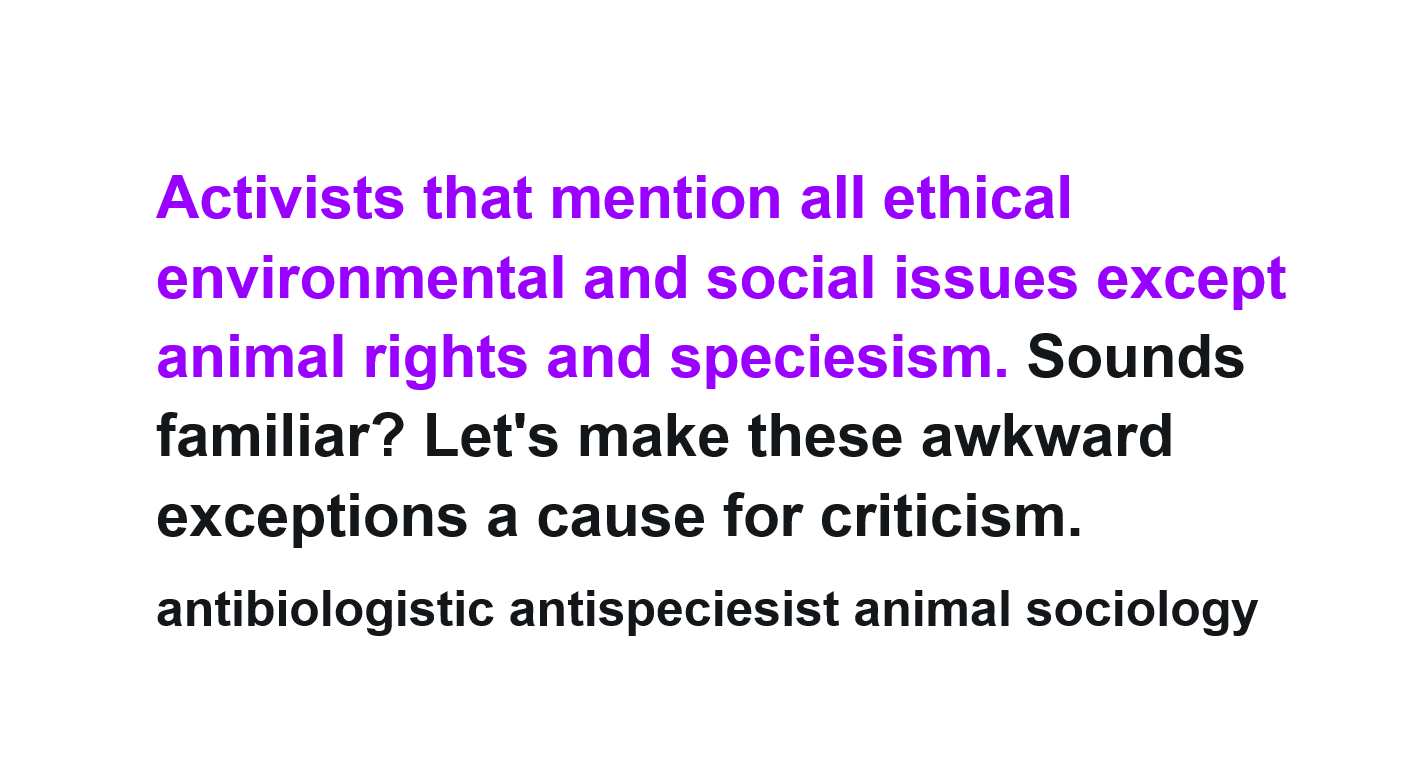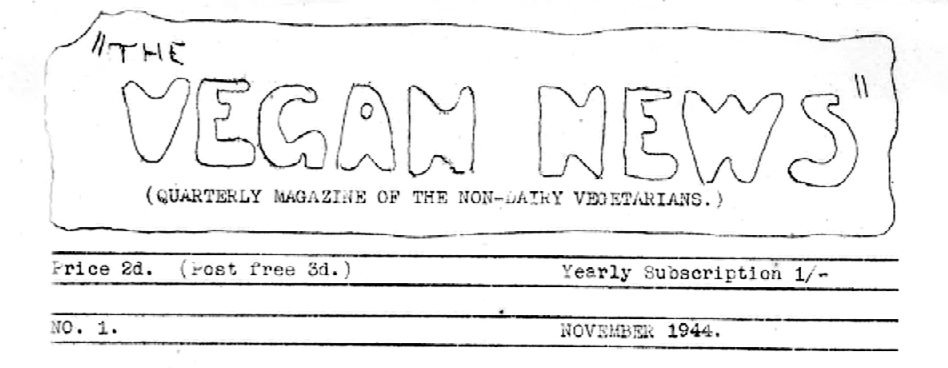
(QUARTERLY MAGAZINE OF THE NON-DAIRY VEGETARIANS.)
Price 2d. (Post free 3d.) Yearly Subscription 1/-
NO. 1. NOVEMBER 1944.
Also available as a scanned PDF of the original newsletter (1.3MB) > get into the matter and into the historical developments at the Vegan Society.
The recent articles and letters in “The Vegetarian Messenger” on the question of the use of dairy produce have revealed very strong evidence to show that the production of these foods involves much cruel exploitation and slaughter of highly sentient life. The excuse that it is not necessary to kill in order to obtain dairy produce is untenable for those with a knowledge of livestock farming methods and of the competition which even humanitarian farmers must face if they are to remain in business.
For years many of us accepted, as lacto-vegetarians, that the flesh-food industry and the dairy produce industry were related, and that in some ways they subsidised one another. We accepted, therefore, that the case on ethical grounds for the disuse of these foods was exceptionally strong, and we hoped that sooner or later a crisis in our conscience would set us free.
That freedom has now come to us. Having followed a diet free from all animal food for periods varying from a few weeks in some cases, to many years in others, we believe our ideas and experiences are sufficiently mature to be recorded. The unquestionable cruelty associated with the production of dairy produce has made it clear that lacto-vegetarianism is but a half-way house between flesh-eating and a truly humane, civilised diet, and we think, therefore, that during our life on earth we should try to evolve sufficiently to make the ‘full journey’.
We can see quite plainly that our present civilisation is built on the exploitation of animals, just as past civilisations were built on the exploitation of slaves, and we believe the spiritual destiny of man is such that in time he will view with abhorrence the idea that men once fed on the products of animals’ bodies. Even though the scientific evidence may be lacking, we shrewdly suspect that the great impediment to man’s moral development may be that he is a parasite of lower forms of animal life. Investigation into the non-material (vibrational) properties of foods has yet barely begun, and it is not likely that the usual materialistic methods of research will be able to help much with it. But is it not possible that as a result of eliminating all animal vibrations from our diet we may discover the way not only to really healthy cell construction but also to a degree of intuition and psychic awareness unknown at present?
A common criticism is that the time in not yet ripe for our reform. Can time ever be ripe for any reform unless it is ripened by human determination? Did Wilberforce wait for the ‘ripening’ of time before he commenced his fight against slavery? Did Edwin Chadwick, Lord Shaftesbury, and Charles Kingsley wait for such a non-existent moment before trying to convince the great dead weight of public opinion that clean water and bathrooms would be an improvement? If they had declared their intention to poison everybody the opposition they met could hardly have been greater. There is an obvious danger in leaving the fulfilment of our ideals to posterity, for posterity may not have our ideals. Evolution can be retrogressive as well as progressive, indeed there seems always to be a strong gravitation the wrong way unless existing standards are guarded and new visions honoured. For this reason we have formed our Group, the first of its kind, we believe, in this or any other country.
ORGANISATION OF THE GROUP
Our 25 Members are scattered far and wide, therefore a Committee is not possible. In the absence of other volunteers I have undertaken the duties of Hon. Secretary, Hon. Treasurer, and Hon. Auditor, and if this undemocratic Constitution offends, I am open to receive suggestions of any scheme that would enable me, either intentionally or accidentally, to embezzle the Group’s funds from subscriptions of a shilling a year!
The work of the Group at first will be confined to the propaganda contained in the bulletin. Very great interest has recently been aroused by our arguments, and it seems certain that the bulletin will be widely read. Many orders for the first four quarterly issues have already been received, and more will come when we advertise. Mr J.W.Robertson Scott, Editor of “The Countryman”, has written to us – “I should be glad to hear what success you have in collecting non-dairy produce consumers. I have always felt that from the agricultural point of view the vegetarian occupies an illogical position, for just as eggs cannot be produced without killing cockerels, dairy produce cannot be economically got without the co-operation of the butcher.” The clarity by which vegetarians generally are seeing this issue is well represented by the result of a recent debate arranged by the Croydon Vegetarian Society, when the motion was carried almost unanimously ‘That vegetarians should aim at eliminating all dairy produce’. If we remember rightly the voting was 30 to 2.
Our Members are pronounced individualists, not easily scared by criticism, and filled with the spirit of pioneers, and one feels they will never allow their magazine to degenerate into a purely secretarial production. All are invited to subscribe something periodically to make the magazine interesting, useful, and thought provoking. Could we have a series of articles (of about 600 words) on “My Spiritual Philosophy”? Articles, letters, recipes, diet charts, health records, press cuttings, gardening hints, advice on baby culture, advertisements (free to Members), all will be welcome. Letters of criticism from those who disagree with us will also be published. This is real pioneer work, and if we cooperate fully we shall certainly see an advancement in humanitarian practice, and perhaps we shall reveal some otherwise inaccessible dietetic truths. Let us remember how very much of modern dietetic research is fostered by vested interests and performed in vivisection laboratories, and that incidentally we are still without much data concerning the merits of diets free from animal food. We know that domesticated animals to-day are almost universally diseased, therefore so long as 99.9999% of the population consume the products of these diseased bodies, how are we to measure the mischief such foods may be doing? A hundred people living strictly on a ‘live’ non-animal diet for a few years would furnish data of inestimable value. Government grants have been made for much less useful social work!
WANTED – A NAME
We should all consider carefully what our Group, and our magazine, and ourselves, shall be called. ‘Non-dairy’ has become established as a generally understood colloquialism, but like ‘non-lacto’ it is too negative. Moreover it does not imply that we are opposed to the use of eggs as food. We need a name that suggests what we do eat, and if possible one that conveys the idea that even with all animal foods taboo, Nature still offers us a bewildering assortment from which to choose. ‘Vegetarian’ and ‘Fruitarian’ are already associated with societies that allow the ‘fruits'(!) of cows and fowls, therefore it seems we must make a new and appropriate word. As this first issue of our periodical had to be named, I have used the title “The Vegan News”. Should we adopt this, our diet will soon become known as a VEGAN diet, and we should aspire to the rank of VEGANS. Members’ suggestions will be welcomed. The virtue of having a short title is best known to those of us who, as secretaries of vegetarian societies have to type or write the word vegetarian thousands of times a year!
OUR RELATIONS WITH THE LACTO-VEGETARIANS
The object of our Group is to state a case for a reform that we think is moral, safe and logical. In doing so we shall, of course, say strongly why we condemn the use of dairy produce and eggs. In return we shall expect to be criticised. It will be no concern of ours if we fail to convert others, but we do think it should concern them if, deep in their hearts, they know we are right. In any case, there need be no animosity between ourselves and the ‘lactos’. We all accept that lacto-vegetarianism has a well appointed place in dietary evolution, and for this reason several of us spend a great deal of our time working for the lacto-vegetarian Cause. During recent years the two national vegetarian societies have devoted much space in their magazines to this question of the use of dairy product, and we have every reason to believe they will attach importance to our work and occasionally report on it. (Before forming the Group, the suggestion was made to The Vegetarian Society that such a Section be formed as part of the Society. The suggestion was considered sympathetically by the Committee, who decided that the full energies of the Society must continue to be applied to the task of abolishing flesh-eating, and that any such Group would, therefore, be freer to act as an independent body.) The need to prove that it is possible to thrive without dairy produce is, of course, far too important for any lacto-vegetarian to ignore. To resign oneself to lacto-vegetarianism as a satisfactory solution to the diet problem is to accept a sequence of horrible farmyard and slaughter-house incidents as part of an inevitable Divine Plan. Need it be added that it would imply too accepting the spectacle of a grown man attached to the udder of a cow as a dignified and rational intention on the part of Nature!
Without making any claims to self-righteousness, we feel in a strong position to criticise lacto-vegetarianism, because the worst we can say will be but a repetition of criticism we have already levelled against ourselves. Therefore we shall express the Truth as we see it and feel it, and though our friends the lacto-vegetarians may reject our ideas if they wish, we hope they will not reject us for stating them.
CONCERNING OURSELVES
So far as we are aware, every Member of our Group has discarded the use of dairy produce for humanitarian reasons. We are not by any means ignorant of orthodox dietetic theories, and in exercising our moral conviction we find we must refute some of these theories. We do so without fear because we feel that a moral philosophy combined with a dash of common sense is a more rational guide than theories hatched in vivisection laboratories. We will not accept that adequate nutrition need violate conscience. We question very strongly whether those dieticians who laud the praises of animal proteins have ever tried living on a sensible diet free from such proteins, and if they have not, we fail to see how they can pass useful judgment. We know that man’s anatomy is unquestionably frugivorous. We know that milk drinking by adults is an absurdity never intended by Nature. We know that we are at least as well without dairy produce as we were with it. We know that 40% at least of cows are now tubercular. We know that pasteurisation enables the milk retailers to sell milk several days old. We know what happens to those who feed on the ‘nourishing first-class proteins’ recommended by orthodox dieticians – they nearly all die of malignant and filthy diseases. Heaven help us if our diet fails us to anything like the same degree!
Apart from saying that we are ‘Quite well, thanks’, we consider the time perhaps premature to make any great claims for the physiological superiority of our diet. Humbly, your Secretary is able to state that he can now cycle 230 miles in a day, whereas years ago when he stoked himself with milk and eggs he was ready for Bed and Breakfast after doing half that distance. He can also dig his allotments for ten hours a day without feeling any different next morning, but we must be careful in making claims lest the world hears of us and expects to meet eight foot rosy cheeked muscular monsters who are immune to all ills of the flesh. We may be sure that should anything so much as a pimple ever appear to marr the beauty of our physical form, it will be entirely due in the eyes of the world to our own silly fault for not eating ‘proper food’. Against such a pimple the great plagues of diseases now ravaging nearly all members of civilised society (who live on ‘proper food’) will pass unnoticed. It is as well that we gird ourselves to meet our critics! In our more reflective moments we cannot help thinking that there are greater risks in life than living on clean salads, fruits, nuts, and whole cereals. We can hardly wish to be classed as moral giants because we choose to live on a diet so obviously favouring self preservation.
Believing that some Members may wish to correspond with each other, we propose to publish in our next issue their names and addresses. Any Member preferring not to be included in the list should let me know.
We hear that a pamphlet opposing the use of milk was written 40 years ago by a Harley Street specialist. Does any Member happen to know anything of this publication?
CONCERNING THOSE NOT YET WITH US
We agree that to eliminate all dairy produce creates personal difficulties which vary in magnitude from one individual to another. We agree also that the present is not the easiest time to make such a change, but we think that in laying the foundations of our Movement now, many will soon join us as one of their ‘Peace Aims’. We know that there is particular unrest in the minds of vegetarians generally concerning the use of rennet in cheese making, and as this appears to be the most glaring inconsistency of lacto-vegetarianism, we suggest that others do as we did and eliminate cheese first. Our friend and fellow member Dugald Semple tells us he has never tasted cheese, therefore it cannot be considered as an essential ‘binding agent’ for body and soul! The following passages from the editorial of the current issue of “The Vegetarian News” does not, we think, allow of much argument: “Most vegetarians are doubtless aware that the use of calve’s rennet in the production of cheese has always presented a problem to anyone of humane principles, necessitating as it does the killing of calves to obtain the rennet. In the supposed absence of any purely vegetarian substitute for rennet some vegetarians abstain altogether from the use of cheese, except for the simple cottage varieties, while probably the majority of vegetarians take their ration of ordinary cheese and try to forget the incidence of the calve’s rennet in its making.” Should moralists dissipate their energies trying to forget such things?
During the war eggs have all but vanished, and they can readily be dispensed with for good without any sense of loss if one dwells on the fact that they are for the most part nothing more than reconstituted grubs and beetles! The elimination of milk undoundtedly presents the greatest difficulty. Nut milk is a good substitute, but it does not go well in tea (therefore cut out the tea and add yet another ten years to your life!)
Those of us who have lived for long periods without dairy produce are able to give the assurance that we remain well and strong; that we enjoy our food as much as ever, and that once the new diet has been arranged the sight and smell of dairy produce is soon forgotten.
“The incidence of disease of one kind and another continues to be a great limiting factor in milk production, besides involving loss to the farmer. Tuberculosis is one of the most intractable sources of trouble, so much so that a speaker at the Farmers’ Club recently said we had made no progress in the last 40 years.”
The Agricultural Correspondent,
“The Yorkshire Post”,
18.11.44.
“Give me a drink of whisky, I’m thirsty.”
“You should drink milk – milk makes blood.”
“But I’m not blood-thirsty.”
67 Evesham Road,
Leicester.
November 24th, 1944.
Donald Watson.
